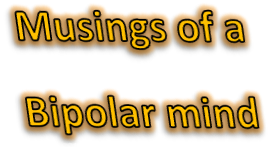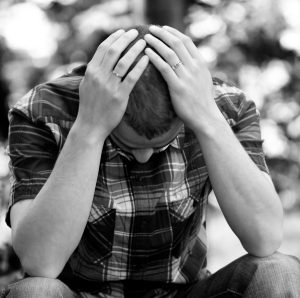A couple months ago, I shared a couple times on Facebook some of the honest feelings and events that have happened while dealing with a bi-polar med change. I was encouraged by someone who has been instrumental in helping guide my blog (although I will assume all p ersonal responsibility for it’s recent neglect…) to share my experience a bit more if I was ever inclined. Well, today is that day. (Oh, and thanks Janice!).
ersonal responsibility for it’s recent neglect…) to share my experience a bit more if I was ever inclined. Well, today is that day. (Oh, and thanks Janice!).
I am going to do this by simply sharing some observations/thoughts/questions/random perspectives I’ve had through my bi-polar experiences. I am on the high side today, so my brain is operating a little too fast, these thoughts may seem scattered, my spelling/grammar will be poorer than it’s usual awful state (unless Janice has a chance to correct before you see this, which she has been known to do..) but tomorrow this post will probably be too hard to write, so we’ll give it a try.
1) My experience will not match anyone else’s, bi-polar, no different than anything else is not a one-size fits all label.
As an example, one fairly unique thing about my bi-polar experience; it is rapid cycling and on a very set 48 hr pattern, when things are unstable I know that 24 hrs later I will feel completely different. Longer ago I used to think if I just “tried harder” I could change that, but I’ve learned that the brain is no different than any other organ, it does not respond real well to just “trying harder”. Imagine if you told someone with a broken wrist or high-blood pressure that if they just “tried harder” it would be better; that seems absurd, yet oftentimes that’s how we treat brain malfunctions.
2) It’s doubtful your going to do or say the wrong thing
I hear this a lot. I’ll share some info about being bi-polar with someone, and they want to know what/if they are doing wrong. First, if I trust you enough to personally share details of my health with you, I probably consider you a friend.. on the other hand, if I just write about it on my blog, I’m probably just having a high day! I often get asked: What can I do to help?, does x/y that I do make this hard/worse? I really, deeply appreciate the concern, but really, this truly is just my brain malfunctioning… I may display more emotion than normal, ranging from appearing withdrawn to excess anger, but in the end.. if I’m upset at you, if I love you, if I distrust you, if I care about you deeply.. whatever my feelings toward you are, they really fundamentally aren’t going to change just because my brain happens to be wacko at the moment. There really is nothing you can do… except…
3) If your a friend or family member of someone struggling with this, remember you role, you ARE NOT the doctor, psychiatrist, or counselor.
I know you desperately want to help, I know you care deeply and hate to see someone you love struggle so. But if there’s one thing you take away from what I am writing today, take this: Just be there, as a friend, as a mom/dad/sibling, whatever. I know we want things fixed, I know we live in a very, very impatient world.. but this is hard and difficult stuff. There are many, many experts out there that know far more about how to deal with this potentially deadly situation (yes, bi-polar has a very high rate of suicide, and it is not just confined to down days unfortunately) TRUST THEM! Your role is simply to be a friend, to be there.. If the one you love is down, silence is fine, it may feel awkward, but you don’t have to say anything, just being there is ok. on the other hand, they may want to be left alone, they may want no one around, that’s ok too, respect that. When their high, they may want to talk way too much, to be agitated, easily upset, you may get tired of listening, of having them around… try to remember that will pass too. Be there to support, to encourage, meds and counseling are good, they are not instant or guaranteed fixes. Respect the decisions the bi-polar person in your life is making, try to help, try to encourage, but realize you can’t do it for them. By all means there are times where their own personal safety or others are at risk, and those can be tough decisions, but most of the time, a bi-polar person just needs a friend, that is all.
4) Well.. I guess maybe three items is enough for today…
I was going to make this a long list, but I’m getting bored now.. and have other things on my mind, that’s typical of a high day. So I’ll probably just leave it at this. For those interested in a little of my specific experience: In the spring of 2003, I began to experience fairly intense up/down days, not sure the cause, we were very busy on the farm, had taken on some new things, maybe just reached the point of over-stressed. Because of the rapid-cycling nature, my local family doctor did not suspicion bi-polar and gave me standard anti-depressants, which made the problem worse. At the worst, I would lay in bed practically all day, and the next day be literally bouncing off the walls. I finally got on lithium, which controlled the symptoms very well for the last ten years or so, unfortunately a kidney number started to rise (known issue) and I needed to find new meds. The last few months have been far better than when the original symptoms showed up, but yet difficult as we try to find the right combination of meds, deal with new side effects, possible personality changes of new meds, etc.
My goal in sharing is simply to help bring understanding to something that can be difficult to understand and oftentimes even more difficult to talk about. Anyone that has any specific questions or would like to discuss any of this a bit more privately feel free to email me daringrimm at gmail dot com.
 business savvy with your culinary skills, I think we’d have a real winner. Red Lobster wouldn’t stand a chance! Why once we established the first restaurant we could franchise the concept! Carlos, we could make millions!!” Brian was so excited he pounded Carlos on the back, nearly dumping them both in the water.
business savvy with your culinary skills, I think we’d have a real winner. Red Lobster wouldn’t stand a chance! Why once we established the first restaurant we could franchise the concept! Carlos, we could make millions!!” Brian was so excited he pounded Carlos on the back, nearly dumping them both in the water. 

